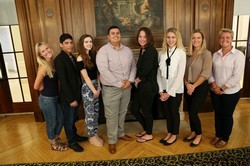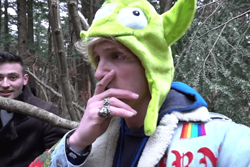Real and Fabricated Rumors Traveling Around the University are Dismissed
Regardless of how rumors begin, spread, and end, they often serve the common purpose of providing people with amusement. While some rumors are made for sheer entertainment, others can be harmful or malicious, and rumors around the University is no exception.
Vice President of Student Services, Mary Anne Nagy, tackles the University’s most conspicuous rumors, as told by students.
Just about every student knows the 15 minute rule – if your professor is 15 or more minutes late, you have the right to leave class, unpunished. The rule also applies to doctors, who are awarded 20 minutes.
Senior Leah Russo has left with classmates after a professor failed to show up after ten minutes. The next class the professor said that it’s his class time and he can do whatever he wants with it and that a professor should be on time just as he or she expects the students to be, explained Russo.
Sophomore Allie Servidio said, “Personally, it has never happened to me, but whenever a professor is a couple of minutes late, everyone in the class always jokes about leaving as soon as 15 minutes are up.”
As for University procedures, “There is no process, protocol, or policy that is established that would outline this,” said Nagy. Rather than leaving when growing impatient for your instructor, she suggests going to the head of the department, often located within the same building reporting that the class is there without faculty supervision.
Golf carts, the University’s most privileged form of transportation, are also known as the ticket to a student’s free tuition. It is often said that if a student is struck by a golf cart, the individual is awarded with no scholastic expenses for the term.
“If that was the case, I would have gotten hit a long time ago,” says Russo. Acknowledged by a majority of students as trivial gossip, the golf cart rumor is more of a source of laughter than concern. Junior Amanda Lawrence said, “I never heard that, but what an awesome idea! I feel like way too many students would be throwing themselves in front of golf carts if that were the case.”
“Completely fictional,” said Nagy in response to the golf cart tale. Nagy provides both drivers and pedestrians with solutions to avoid any chance of the event happening all together. “Drivers must remember that they are driving on pedestrian roadways,” said Nagy. She adds, “Students and faculty must remain cognoscente of the roadway. If pedestrians remain on the side of the road while vehicles approach, all problems can be avoided.”
Want another way to get free tuition? Allegedly, Shadow the mascot attends the University free of charge in exchange for an entire year of duty.
Although not one of the University’s most popular rumors, I myself am guilty of believing it. “I’d most likely volunteer and make a fool out of myself to cut my debt from student loans later and become the mascot,” said Lawrence.
Nagy confirms Shadow the mascot does not get free tuition. “The student may be a student employee, but working as the mascot is not a scholarship position,” said Nagy. The job of Shadow is not compensated the same way as students who receive funds for being a scholarship athlete on the football, basketball, or any other University team.
It is not only rumored that free tuition is given to students, but also that straight A’s are prearranged for any student whose roommate passes away. Allegedly, 4.0’s are automatically given to these students for enduring the emotional hardship.
“I’ve heard this one too and it’s actually really disturbing,” said Servidio. “Obviously if your friend dies, your professors should be extremely lenient with you and give you time to breathe, but I don’t think an automatic 4.0 is very realistic.”
In response, Russo says, “Hopefully, if your roommate dies, you are concerned with greater things than getting a 4.0.”
Nagy said this rumor has been around since she was in college, and in no way does a student receive any form of automatic grades. However, “The school does work with the student in as many ways possible to compensate them however they can to make sure they had the emotional support they needed to get through the horrible tragedy,” said Nagy. Facilities such as psychological services are available to all students and the school is also willing to work with members of the faculty to ensure any academic support needed such as having extra time on tests, receiving incomplete marks for courses, or having the ability to withdraw late from a class without penalty is provided to the student.
Although food services on campus may not be gourmet, there is another looming reason not to eat the University’s food – small amounts of laxatives are placed inside the processed food so that it is easier to pass.
Servidio says, “I have heard this a million times! My family friend who is an alumni once gave me a whole scientific explanation on it, but somehow I still don’t really believe it.”
Nagy laughs, “Unless someone is putting them in as a practical joke,” she said, “the answer is no.” Nagy, who eats in the dining hall with enough frequency knows that’s not the case. Is it something that is done or condoned by food services? The answer is no.
The idea of paranormal activity is nothing new to the University’s campus, from Pollack Theater and the Guggenheim Library to Wilson Hall, ghost stories alike have had a longstanding relationship with students and faculty.
Supposedly, Pollack Theater was once a horse stable where a young boy was instantly killed after getting kicked in the head by one of the horses. His spirit remains in the theater and haunts the top floor. The Library, home of Mrs. Guggenheim whose husband was killed in the sinking of the Titanic, walks about after hours waiting for him to come home. Wilson Hall, once occupied by American President Woodrow Wilson, is said to be haunted by a helper who was raped and left for dead in the basement by a fellow employee. Other rumors suggest she hung herself.
Servidio said, “I believe the library is haunted because I’ve heard stories about the Guggenheims.” As for other buildings, she would not have trouble believing the stories because some parts of the University can seem so creepy. “Word of mouth is common at our school because it is so small,” she said. “So I would understand why people would believe the stories because they are always being told. Also, during Halloween, there’s an activity where students can learn about all the ghost stories on campus, which makes it seem more believable.”
Nagy, who has heard the rumors from colleagues herself, has no definitive answer in regard to the alleged paranormal activity. “I know people who have heard things, said things,” said Nagy. “Things like people seeing ghosts walking around, smelling food that has been cooked. There’s always a possibility, but I have never experienced it.”
True or false, rumors exist. Nevertheless, these stories withstand time and are passed from student to student here at the University. Although the stories may not be true, they have the ability to provide members of the community with both humor and fright. Regardless of their veracity, rumors on campus will continue to circulate for years to come.


